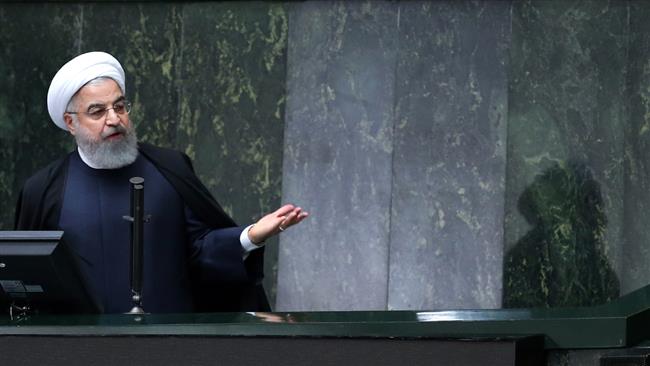Is Iran realigning because of Syria and Trump decision on Jerusalem?
LATEST
- Zarif to Europe: “Work With Us”
- UK Visit: State Media Avoids Any Mention of Political Prisoner Zaghari-Ratcliffe
Signaling a possible shift in Iran’s political strategy, President Hassan Rouhani has said Tehran can restore relations with Saudi Arabia if the kingdom ends its military intervention in Yemen’s civil war and cuts links with Israel.
Addressing Parliament on Sunday, Rouhani said, “Saudi Arabia should suspend it bombardment of Yemen and stop begging for contacts with the Zionist regime. We want Saudi Arabia to stop two things: the misguided friendship with Israel and the inhuman bombardment of Yemen.”
Saudi Arabia cut relations with Iran in January 2016 after a crowd attacked the Saudi Embassy in Tehran, protesting Riyadh’s execution of a prominent Shia cleric. The two sides have been on opposite sides of conflicts across the Middle East, including the Syrian conflict and Yemen’s civil war.
However, there have been signs of a possible accommodation over Syria, where Iran has provided essential military support for the Assad regime since 2012 and the Saudis have backed opposition groups and rebels. Riyadh hosted a conference last month in which a reformed opposition, including factions backed by Assad’s other key ally Russia, were included.
The Iranians may also be under pressure from Russia, which has shown signs of a willingness to step away from Bashar al-Assad if not the Syrian regime and its system. A Russian official indicated to EA last weekend that Moscow may be considering an arrangement in which Assad is set aside in return for guarantees of reconstruction assistance for regime-held areas and support for a Syrian economy which has lost more than 75% of GDP since 2011.
Another catalyst for Rouhani’s approach towards Saudi Arabia may be last Wednesday’s recognition by Donald Trump of Jerusalem as the Israeli capital. Iranian officials see the Trump statement as an opportunity to galvanize Islamic and Arab opinion alongside the Islamic Republic. With respect to Riyadh, the turn of events could unsettle Saudi Arabia’s developing, private links with Israel in a political, economic, and military cooperation against Iran.
Rouhani applied pressure yesterday:
After regional powers’ conspiracy to let terrorist groups dominate the oppressed people in the region was defeated, the Americans today have launched a new plot with the help of the Zionists, which is an aggression on the sacred Quds [Jerusalem].
We were not, are not and will not be silent in the face of the conspiracies of the big powers, the US, the arrogance, and Zionism.
Still, Rouhani’s signal for a new line with Riyadh could be challenged by other factions in the Iranian system, notably the Revolutionary Guards. The President’s foreign policy of “engagement”, including exchanges with Saudi Arabia, has been opposed by hardliners before and after the break of relations in January 2016.
Zarif to Europe: “Work With Us”
Using an opinion piece in The New York Times, Foreign Minister Mohammad Javad Zarif has appealed to Europe to cooperate with Tehran.
Amid US sanctions and ongoing issues for the Iranian economy — including the hesitancy of European companies to pursue trade and investment with the Islamic Republic, for fear of American punishment — Zarif’s priority is the promotion of the July 2015 nuclear deal:
Implicitly responding to pressure from French President Emmanuel Macron for negotiations over Tehran’s ballistic missile research and development, Zarif writes, “Iran’s military capabilities comply with international law and are entirely defensive.”
Zarif also presents Iran’s line on regional issues that “as Iran and its partners labor to put out fires, the arsonists
in our region grow more unhinged”. He converts Tehran’s essential economic and military support of the Assad regime, including the deaths of hundreds of thousands of people into “Iran is proud of taking the lead in trying to bring an overdue end to the bloodshed in Syria”. And he contrasts Saudi Arabia’s “brutal bombing campaign” in Yemen with an Iranian plan for “an immediate cease-fire and humanitarian assistance, followed by national dialogue to establish an inclusive government”.
UK Visit: State Media Avoids Any Mention of Political Prisoner Zaghari-Ratcliffe
Iranian State media continues to avoid any mention of the Anglo-Iranian political prisoner Nazanin Zaghari-Ratcliffe in its coverage of the two-day visit of UK Foreign Secretary Boris Johnson.
In meetings on Saturday and Sunday, Johnson saw President Hassan Rouhani, Foreign Minister Mohammad Javad Zarif, and the Secretary of the Supreme National Security Council, Ali Shamkhani.
The UK Foreign Office said the talks, including discussion of Zaghari-Ratcliffe, were “frank and constructive”. However, in a statement it avoided any specific reference to the charity worker, who was seized in April 2016 and is serving a five-year sentence. Instead, the Foreign Office referred to “the Foreign Secretary’s concerns about the consular cases of British-Iranian dual nationals”.
Iran’s Press TV ignored Zaghari-Ratcliffe to highlight Rouhani’s line on Donald Trump’s recognition of Jerusalem as the Israeli capital: “Trump’s Jerusalem Decision Adds Fuel to Mideast Tensions”. State news agency IRNA proclaims British support of the July 2015 nuclear agreement: “UK Calls for Best Use of Iran Nuclear Deal Opportunity”.
Rouhani’s website also focuses on Jerusalem and the nuclear deal, challenged by ongoing and expanding US sanctions, while hailing, “We welcome amicable, balanced Tehran-London ties.”
There was no sign of any Iranian movement towards a release of Zaghari-Ratcliffe, accused of pursuing the overthrow of the Iranian regime through the training of journalists. However, Iran’s judiciary did step from a court hearing which was reportedly scheduled on Sunday to put more pressure on the detainee.

